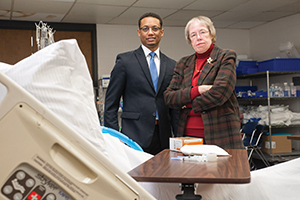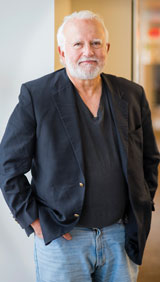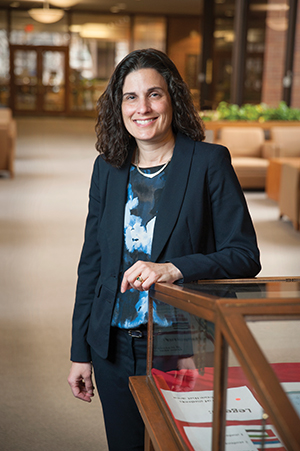features
A GOOD DEATH
 photo: Mike Sands
Ronald Hickman and Barbara Daly
photo: Mike Sands
Ronald Hickman and Barbara Daly
A wife pores over her comatose husband's Facebook posts for clues to his medical preferences. A virtual coach helps guide a son making end-of-life decisions for his mother.
The rapid expansion and adoption of online technologies has added another layer of complexity to myriad ethical issues that affect decision-making around the reality that every human being must face: We all die.
Biomedical breakthroughs increasingly can extend human lives and have given rise to the belief that we can control some of the circumstances of our death. But those gains also create ethical dilemmas. Who makes the decisions about the end of another person's life? What is an informed decision? At what point do we turn off the machines? And how do new technologies play into such questions?
These are the kinds of difficult and emotional issues that Case Western Reserve experts grapple with daily in patient care and research. Their work evolves through new tools, including online patient education and social media, and carries influence well beyond the students they teach. Yet, the fundamental question remains the same: How can we better help individuals and families with end-of-life decisions?
"In ethics, there's no lab test to figure out what's right," explained Barbara Daly, PhD (NUR '72), Distinguished University Professor, Gertrude Perkins Oliva Professor of Oncology Nursing at Case Western Reserve Frances Payne Bolton School of Nursing and director of clinical ethics at University Hospitals Case Medical Center.
Daly, who began her career as an intensive-care unit nurse, has led or co-led more than $13 million in research funded by the National Institutes of Health to improve patient and caregiver experiences and provide guidance to doctors and nurses.
She believes a generation of specialization yielded a health-care system that has removed a central relationship.
"The old family physician who birthed you, who took care of the whole family—that model is gone," she said. "Now you may have seven doctors, one for each organ. We have strangers taking care of strangers. In order to provide the best care, we must know patients in their life, not just as someone in a bed."
In a recent research project with nursing school colleagues, she studied how a team composed of advance practice nurses, social workers, a spiritual adviser and the patient's oncologist could better support terminally ill cancer patients and their families. The group began end-of-life conversations with patients and their caregivers at the first diagnosis of a latestage cancer, meeting over months to explain what was happening and why as the patients' health declined.
The results showed that those regular personal conversations helped. Caregivers with the long-term aid of the cancer support team were more satisfied—compared with caregivers of patients who did not receive the intervention—with their loved ones' end-of-life care in five areas: pain relief, managing pain, speed in treating symptoms, information about side effects and coordination of care.
Knowing the patient's wishes, particularly at the end of life, presupposes good communication between health-care providers and the patient. But it also relies on honest conversations between the individual and his or her family. Technologies now enable individuals to choose not only the circumstances under which they live, but also the timing of their deaths.
 photo: Mike Sands
Stuart Youngner
photo: Mike Sands
Stuart Youngner
"It's a pretty new phenomenon, the timing of death as a matter of human decision," said Stuart J. Youngner, MD (MED '70), Susan E. Watson Professor of Bioethics and a professor of psychiatry. "Data show that in 75 to 80 percent of cases, a decision is made. It's part of the landscape of dying these days." Youngner's recent work on death and dying has focused on varying definitions of death and ethical issues in organ and tissue retrieval and transplantation.
Advanced care directives, or living wills, are the most common methods for informing caregivers whether a terminally ill patient wants life-sustaining measures. Just over 25 percent of American adults have arranged a living will or durable power of attorney for health care.
But the rise of social media created new ways for individuals to write their final chapters. The case of Brittany Maynard, a 29-year-old brain cancer patient who ended her life last fall in her Portland, Ore., home, came to public attention as she posted comments on her condition and decision on Facebook and other online forums.
Jessica Berg, JD, MPH (GRS '09, public health), interim dean of the law school, Tom J.E. and Bette Lou Walker Professor of Law and professor of bioethics and public health, sees online comments as a new frontier for bioethics. She recently authored the chapter "The Effect of Social Media on End-of-Life Decision Making" in The Oxford Handbook of Ethics at the End of Life, which was co-edited by Youngner and is being published by Oxford University Press.
 photo: Mike Sands
Jessica Berg
photo: Mike Sands
Jessica Berg
Berg pointed out that social media already has been used as evidence in cases involving divorce, child custody, employment and crime. With those precedents, she expects courts likely will consider what a dying person posted on social media before losing the ability to express his or her wishes. "In fact, [the courts] may give it greater weight than remembered spoken conversations," she wrote in her Oxford Handbook contribution.
Communicating end-of-life wishes to family members is still difficult. Daly calls living wills "a blunt instrument" that provides clear answers in only a limited number of situations. "Their saving grace is that when they're filling them out, people talk to each other: 'What makes your life worthwhile? What would be unacceptable?'"
In the hospital, however, these conversations may come too late. "It's complicated most often because there is a lack of consensus among all the actors—the patient, the family, the nurse, the 14 consultants on the case—about what represents the best interest of the patient," she explained. "Most often, the patient can't participate. Families are overwhelmed with guilt and uncertainty."
Ronald L. Hickman Jr., PhD (CWR '00; NUR '06, '13; GRS '08), an assistant professor at the nursing school, has focused his recent research on family caregivers' decision-making conflicts and regret. Hickman also sees such emotions play out on the hospital floor as an acute care nurse practitioner in the Department of Anesthesiology and Perioperative Medicine at UH Case Medical Center.
Hickman believes that, just as social media can facilitate conversations about end-of-life issues, so can software programs that use avatars (computer-generated virtual coaches) to introduce these topics. He said the software he created with an interdisciplinary university team and a $475,000 grant from the National Institute of Nursing Research is now being tested with families at UH. It guides a patient's caregivers through a series of questions that can go in different directions, depending on the responses to the initial questions.
"We don't deal with the specifics of the diagnosis, but on how the caregiver perceives the patient's quality of life and whether there have been conversations about end-of-life care," Hickman emphasized. He said the final phase of this two-year study will follow up with the caregivers to determine whether the technology improved patient outcomes or the quality of their decision-making.
Life-or-death decisions will never be simple. But Daly believes that health-care providers can, with training and attention to these issues, communicate with patients and families with empathy and candor. She believes that process must start while individuals can express their own wishes. "All our conversations take place in context of a death-defying society," she said. "We don't like to think about it, and we don't plan ahead."






